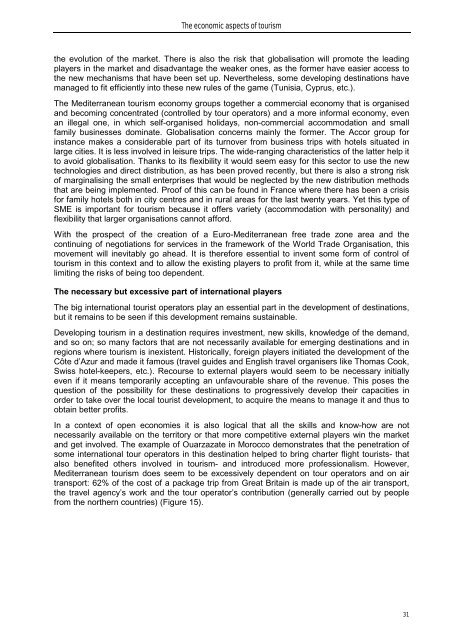dossier sur le tourisme et le développement durable
dossier sur le tourisme et le développement durable
dossier sur le tourisme et le développement durable
Create successful ePaper yourself
Turn your PDF publications into a flip-book with our unique Google optimized e-Paper software.
The economic aspects of tourism<br />
the evolution of the mark<strong>et</strong>. There is also the risk that globalisation will promote the <strong>le</strong>ading<br />
players in the mark<strong>et</strong> and disadvantage the weaker ones, as the former have easier access to<br />
the new mechanisms that have been s<strong>et</strong> up. Neverthe<strong>le</strong>ss, some developing destinations have<br />
managed to fit efficiently into these new ru<strong>le</strong>s of the game (Tunisia, Cyprus, <strong>et</strong>c.).<br />
The Mediterranean tourism economy groups tog<strong>et</strong>her a commercial economy that is organised<br />
and becoming concentrated (control<strong>le</strong>d by tour operators) and a more informal economy, even<br />
an il<strong>le</strong>gal one, in which self-organised holidays, non-commercial accommodation and small<br />
family businesses dominate. Globalisation concerns mainly the former. The Accor group for<br />
instance makes a considerab<strong>le</strong> part of its turnover from business trips with hotels situated in<br />
large cities. It is <strong>le</strong>ss involved in <strong>le</strong>i<strong>sur</strong>e trips. The wide-ranging characteristics of the latter help it<br />
to avoid globalisation. Thanks to its f<strong>le</strong>xibility it would seem easy for this sector to use the new<br />
technologies and direct distribution, as has been proved recently, but there is also a strong risk<br />
of marginalising the small enterprises that would be neg<strong>le</strong>cted by the new distribution m<strong>et</strong>hods<br />
that are being imp<strong>le</strong>mented. Proof of this can be found in France where there has been a crisis<br />
for family hotels both in city centres and in rural areas for the last twenty years. Y<strong>et</strong> this type of<br />
SME is important for tourism because it offers vari<strong>et</strong>y (accommodation with personality) and<br />
f<strong>le</strong>xibility that larger organisations cannot afford.<br />
With the prospect of the creation of a Euro-Mediterranean free trade zone area and the<br />
continuing of negotiations for services in the framework of the World Trade Organisation, this<br />
movement will inevitably go ahead. It is therefore essential to invent some form of control of<br />
tourism in this context and to allow the existing players to profit from it, whi<strong>le</strong> at the same time<br />
limiting the risks of being too dependent.<br />
The necessary but excessive part of international players<br />
The big international tourist operators play an essential part in the development of destinations,<br />
but it remains to be seen if this development remains sustainab<strong>le</strong>.<br />
Developing tourism in a destination requires investment, new skills, know<strong>le</strong>dge of the demand,<br />
and so on; so many factors that are not necessarily availab<strong>le</strong> for emerging destinations and in<br />
regions where tourism is inexistent. Historically, foreign players initiated the development of the<br />
Côte d’Azur and made it famous (travel guides and English travel organisers like Thomas Cook,<br />
Swiss hotel-keepers, <strong>et</strong>c.). Recourse to external players would seem to be necessary initially<br />
even if it means temporarily accepting an unfavourab<strong>le</strong> share of the revenue. This poses the<br />
question of the possibility for these destinations to progressively develop their capacities in<br />
order to take over the local tourist development, to acquire the means to manage it and thus to<br />
obtain b<strong>et</strong>ter profits.<br />
In a context of open economies it is also logical that all the skills and know-how are not<br />
necessarily availab<strong>le</strong> on the territory or that more comp<strong>et</strong>itive external players win the mark<strong>et</strong><br />
and g<strong>et</strong> involved. The examp<strong>le</strong> of Ouarzazate in Morocco demonstrates that the pen<strong>et</strong>ration of<br />
some international tour operators in this destination helped to bring charter flight tourists- that<br />
also benefited others involved in tourism- and introduced more professionalism. However,<br />
Mediterranean tourism does seem to be excessively dependent on tour operators and on air<br />
transport: 62% of the cost of a package trip from Great Britain is made up of the air transport,<br />
the travel agency’s work and the tour operator’s contribution (generally carried out by peop<strong>le</strong><br />
from the northern countries) (Figure 15).<br />
31
















